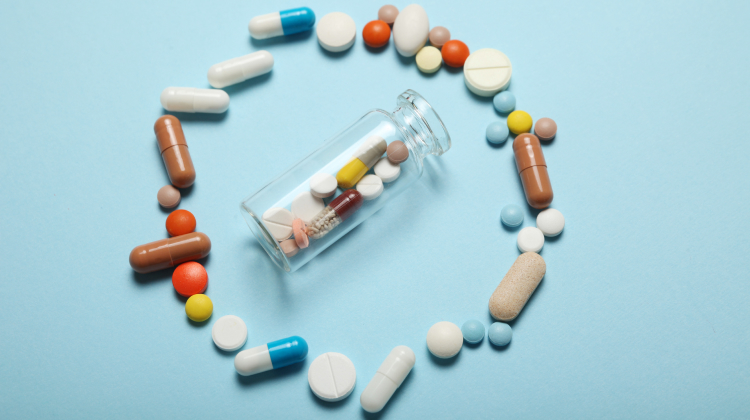Agitated Depression: What Is It, Symptoms, Causes & Treatment 2024

When we think of depression we often imagine someone sad and lethargic, hunched over, with no energy to get out of bed in the morning. However, there are many different types of depression that people can easily miss and mistake for chronic stress or even bad behavior.
While agitated depression isn’t a medical term, it’s used for people suffering from different symptoms[1] of both anxiety and depression. They may carry on with their day normally but frequently display signs of anger, rudeness, and impatience. They may also not show any symptoms but complain of intense inner agitation and psychic pain. This can impact their function, personally, professionally, and societally.
Luckily, with an effective treatment plan and support, people experiencing agitated depression can recover a balanced mood and outlook on life.
What Is Agitated Depression?
This mental health condition is characterized as a type of clinical depression and may be confused with bipolar disorder. It’s referred to as mixed depression[2], which is a major depressive disorder (MDD[3]), but with mixed features[4]. It can mean that a person moves between or concurrently experiences mixed states of both manic and depressive symptoms. This includes physical restlessness (psychomotor agitation), anxious distress, mood swings, anger, and irritability.
Research[4] on agitated depression has been limited, including methods of measuring and diagnosing mixed states. There are also overlapping symptoms with bipolar disorder, making it all the more difficult to diagnose or develop the right treatment plan needed for clinicians. The fact that it’s not an official clinical diagnosis[5] isn’t because it doesn’t exist; it’s because it’s so complex that the medical literature has yet to characterize it succinctly.
Agitated Depression Symptoms
Any type of mental health disorder comes with a wide range of signs and symptoms. Not every person suffering will display the exact same features, but the majority of those with agitated depression will share similar conditions to those with major depressive disorder, such as
- Fatigue
- Insomnia or oversleeping
- Changes in appetite or weight
- Unexplained aches and pains
- General sadness or emptiness
- Little motivation
- Loss of interest in previously enjoyed activities
- Highly self-critical (shame, guilt)
- Low self-worth and self-esteem
- Unable to find meaning in life
- Suicidal thoughts or attempts
What specifically makes someone more likely to be classified as agitated depression are symptoms related to anger and impatience, such as
- Indecisiveness
- Extreme irritability
- Continuous complaining
- Outbursts or temper tantrums
- Constant anger and frustration
- Incessant talking or racing thoughts
- Easily distracted or impulsive
- Restlessness or excessive movement (nail biting, skin or hair picking, fidgeting)
More than two or three manic symptoms combined with depressive episodes is classified as mixed depression by the Diagnostic and Statistical Manual of Mental Disorders (DSM-5). When the mixed features and symptoms come with great lows but aren’t followed by highs, as with typical manic episodes, those suffering are at a higher risk of suicide.
If you or someone you know has several of these symptoms, it’s recommended to contact a mental health professional who not only can offer support, insight, and tools that can lessen the suffering but identify your condition to steer those tools. There are affordable online therapy options available, as well as a national suicide prevention lifeline and hotline, along with support groups[6], to help.
Causes
All mental health disorders are triggered by a variety of factors, from traumatic triggers to genetics to chronic stress. These are some of the risk factors[7] that contribute to the development of agitated depression:
Emotionally unavailable or immature parents
- Little to no emotional support as a child (validation, understanding, or empathy)
Poor coping skills
- Not taught as a child how to express emotions healthily or manage difficult situations
Chronic stress
- Financial worries
- Dysfunctional family or relationship
- Difficult living or working situations
Traumatic life events
- Separation/divorce
- Loss (death of a loved one, losing your home)
- Career changes (job loss, pay decrease, retirement)
- Abuse (physical or emotional)
- War
- Trauma, as with accidents or injuries
Chronic health issues
- Mental illness (anxiety, ADHD, bipolar disorder, or borderline personality disorder)
- Physical illness or disease (hormonal imbalances, hypothyroidism, diabetes, cancer, heart conditions, etc. While menopause isn’t a chronic health “issue,” per se, it does introduce profound changes, hormonally, that can trigger depression.)
Genetics
- Family history of bipolar disorder
Substance use
- Alcohol and other drugs can amplify or trigger anxiety or depression symptoms.
Agitated Depression Treatment
This type of mixed depression is often diagnosed by a psychiatrist after a physical check-up and talk therapy sessions. They review the symptoms specifically related to mixed mania and note if it coincides with a major depressive episode.
Often, MDD is the first diagnosis. With time, the specific type of depression, and ruling out bipolar disorder, may be diagnosed. The doctor may prescribe medication along with talk therapy sessions.
Therapy

Many different types of therapy work as an effective treatment plan. It’s important to not get discouraged when a session or two doesn’t go well with a new therapist; it takes time to find the right fit. As soon as you find someone you feel comfortable with, real progress can begin to take place.
Cognitive behavioral therapy[8] (CBT) and dialectical behavior therapy[9] (DBT) work particularly well for agitated depression. DBT is a modified type of CBT focused on mindfulness, stress, and communication techniques, along with emotional regulation. Group, individual, and online therapy can all be effective methods of treatment.
Medication

The most common medications[10] for agitated depression are antidepressants, antipsychotics, mood stabilizers, and anti-anxiety (anxiolytic) medications. However, since anxiety can worsen with certain medications and agitated depression displays many anxious symptoms, trial and error over time may be needed to find the right dose. Also, the medicine stays the same, but people change: what might be the right medication now may not be in 6 months, and vice-versa.
How To Cope With Agitated Depression?
Focusing on coping mechanisms related to anxiety, anger, and depression can all help alleviate symptoms. Experimenting with different techniques to find what works best for you, and at what moment, will help you develop the lifelong tools needed to manage life’s difficult moments.
Learning to manage and alleviate triggers makes managing and alleviating the symptoms possible, and all the more likely to work efficiently when combined with regular therapy. Here are some tips and practices you can begin to incorporate into your day to reach a routine that gives you a sense of safety and calm.
Try Different Stress Management Techniques

With today’s work-focused and overly busy lifestyles, much of the world is living with chronic stress. While these techniques may sound simple, they’ve all been proven to lower stress in short amounts of time. Taking 20 minutes a day, even if at separate moments, to practice just one of these tips will have long-lasting benefits and alleviate symptoms.
- Journaling[11] or free writing (including writing angrily and letting it all out)
- Time in nature[12] or green space (walking or sitting)
- Writing compassionate[13] letters to yourself
- Art therapy[14] (creative outlets, time for play)
- Meditation[15] (start with two- to five-minute guided meditations)
Learn How To Express and Communicate Your Emotions

The world is just awakening to the much-needed practices of emotional communication. Previous generations, and many now, were not raised with parents who were emotionally available. They too likely grew up with overly strict and emotionally unavailable parents and passed on their insecurities, fears, and traumas to their children.
Without a parent providing loving attention, understanding, empathy, and validation, many people grow up with difficulty expressing their emotions[16]. This leads to anger, anxiety, and depression. Whether it be through books, classes, or therapy, investing your time in developing communication and expression skills is one of the most necessary factors for improving mental health.
Practice Mindfulness

Adding more mindfulness[17] to your day doesn’t have to take a lot of effort. While it may sound boring or challenging (or make you roll your eyes), starting with a few minutes of paying attention–on purpose, without judgment, every day–will naturally grow with time. It helps you slow your breathing and heart rate, beat yourself up less and reduce negative self-talk, and notice some of life’s little joys (like the slow enjoyment of the intense flavor of a fabulous piece of dark chocolate).
Create A Routine

The evidence[18] of the importance of a morning and evening routine for mental health is booming. Routines let us know that there is something secure in our day, and that sense of safety and comfort in knowing the future helps to ease anxiety.
Find whatever balance works for you and try to sleep, eat, and work at regular times (and don’t forget to include some time for your daily stress-relieving activities). Having a routine sleep schedule[19] also helps in many other ways.
Add More Nutrient-Dense Foods

There’s no doubt that what you eat affects your mood, both short and long-term. Prioritizing nutrient-dense foods to give your body all the energy it needs to work at its best will go a long way to improving mental health conditions. Keep in mind that 25% of all energy derived from the diet goes to running the brain.
You don’t have to eat perfectly all day every day; aiming for healthy foods around 80% of the time offers huge benefits. To start, you can try adding something green to every dinner or have yogurt with berries instead of ice cream for dessert. One small and manageable habit change at a time is all you need.
It’s also important to get blood work done to see if you have any deficiencies or hormonal imbalances. Certain deficiencies[20] and health conditions[21] worsen anxiety and depression, and medication might be needed. Otherwise, nutritious foods and vitamins help, such as vitamin B12, folate, vitamin D, and iron for women.
Move Your Body (In A Way That Feels Good)

There’s no need to stress about going to the gym five days a week. Moving your body in any way (and regularly throughout the day) improves mental health. It could be dance therapy, hiking in nature, or even a daily walk in the park. A total of 150 minutes[22] per week is all you need to see the benefits.
Decrease Alcohol, Drugs, and Caffeine

These substances all exacerbate symptoms[23] of both anxiety and depression and should be avoided. (Alcohol is a depressant, caffeine is a stimulant, and drugs–depending on the type, may be either. There are also several apps to help you track and manage your habits, without the pressure to quit cold turkey.
The Bottom Line
Agitated depression is a common mental health disorder that includes symptoms of both anxiety and depression. Fortunately, there are many coping techniques you can learn to do on your own to help. In the long run, reaching out for help offers the best chance for treating agitated depression effectively. Although 70%[24] of those with clinical depression can recover with treatment, it’s sobering to remember that the most common cause of suicide is untreated or inadequately treated depression.
So, don’t be afraid to seek help, even if it’s with a friend (or asking a friend for financial support to afford help). More than half[25] of adults with a mental illness don’t get treatment. With over 50 million Americans experiencing a mental illness, you can improve the odds in your favor by contacting a professional to avoid further suffering.
+ 25 sources
Health Canal avoids using tertiary references. We have strict sourcing guidelines and rely on peer-reviewed studies, academic researches from medical associations and institutions. To ensure the accuracy of articles in Health Canal, you can read more about the editorial process here
- Koukopoulos, A. and Koukopoulos, A. (1999). AGITATED DEPRESSION AS A MIXED STATE AND THE PROBLEM OF MELANCHOLIA. Psychiatric Clinics of North America, [online] 22(3), pp.547–564. doi:10.1016/s0193-953x(05)70095-2.
- Akiskal, H.S., Benazzi, F., Perugi, G. and Rihmer, Z. (2005). Agitated ‘unipolar’ depression re-conceptualized as a depressive mixed state: implications for the antidepressant-suicide controversy. Journal of Affective Disorders, [online] 85(3), pp.245–258. doi:10.1016/j.jad.2004.12.004.
- National Institute of Mental Health (NIMH). (2021). Depression. [online] Available at: https://www.nimh.nih.gov/health/publications/depression.
- Verdolini, N., Agius, M., Ferranti, L., Moretti, P., Piselli, M. and Quartesan, R. (2015). The State of the Art of the DSM-5 ‘with Mixed Features’ Specifier. The Scientific World Journal, [online] 2015, pp.1–7. doi:10.1155/2015/757258.
- Benazzi, F. (2006). Various forms of depression. Dialogues in Clinical Neuroscience, [online] 8(2), pp.151–161. doi:10.31887/dcns.2006.8.2/fbenazzi.
- Mental Health America. (2022). Find Support Groups. [online] Available at: https://www.mhanational.org/find-support-groups.
- Park, Y.-M. (2018). The Mixed-Features Specifier of Major Depressive Disorder in DSM-5: Is It Practical? Psychiatry Investigation, [online] 15(11), pp.1009–1010. doi:10.30773/pi.2018.11.10.
- Gautam, M., Tripathi, A., Deshmukh, D. and Gaur, M. (2020). Cognitive Behavioral Therapy for Depression. Indian Journal of Psychiatry, [online] 62(8), p.223. doi:10.4103/psychiatry.indianjpsychiatry_772_19.
- Panos, P.T. (2014). Meta-Analysis and Systematic Review Assessing the Efficacy of Dialectical Behavior Therapy (DBT) – Patrick T. Panos, John W. Jackson, Omar Hasan, Angelea Panos, 2014. [online] Research on Social Work Practice. Available at: https://journals.sagepub.com/doi/10.1177/1049731513503047.
- Shim, I.H., Bahk, W.-M., Woo, Y.S. and Yoon, B.-H. (2018). Pharmacological Treatment of Major Depressive Episodes with Mixed Features: A Systematic Review. Clinical Psychopharmacology and Neuroscience, [online] 16(4), pp.376–382. doi:10.9758/cpn.2018.16.4.376.
- Niles, A.N., Haltom, K.E.B., Mulvenna, C.M., Lieberman, M.D. and Stanton, A.L. (2013). Randomized controlled trial of expressive writing for psychological and physical health: the moderating role of emotional expressivity. Anxiety, Stress, & Coping, [online] 27(1), pp.1–17. doi:10.1080/10615806.2013.802308.
- Mental Health Foundation. (2022). Nature: How connecting with nature benefits our mental health. [online] Available at: https://www.mentalhealth.org.uk/our-work/research/nature-how-connecting-nature-benefits-our-mental-health.
- Self and Identity. (2022). Self-Compassion: An Alternative Conceptualization of a Healthy Attitude Toward Oneself. [online] Available at: https://www.tandfonline.com/doi/abs/10.1080/15298860309032.
- Bisson, J. and Andrew, M. (2007). Psychological treatment of post-traumatic stress disorder (PTSD). The Cochrane database of systematic reviews, [online] (3), p.CD003388. doi:10.1002/14651858.CD003388.pub3.
- Goyal, M., Singh, S., Sibinga, E.M.S., Gould, N.F., Rowland-Seymour, A., Sharma, R., Berger, Z., Sleicher, D., Maron, D.D., Shihab, H.M., Ranasinghe, P.D., Linn, S., Saha, S., Bass, E.B. and Haythornthwaite, J.A. (2014). Meditation Programs for Psychological Stress and Well-being. JAMA Internal Medicine, [online] 174(3), p.357. doi:10.1001/jamainternmed.2013.13018.
- Apa.org. (2022). APA PsycNet. [online] Available at: https://psycnet.apa.org/record/2001-00558-001?doi=1.
- Parmentier, F.B.R., García-Toro, M., García-Campayo, J., Yañez, A.M., Andrés, P. and Gili, M. (2019). Mindfulness and Symptoms of Depression and Anxiety in the General Population: The Mediating Roles of Worry, Rumination, Reappraisal and Suppression. Frontiers in Psychology, 10(506). doi:10.3389/fpsyg.2019.00506.
- Arlinghaus, K.R. and Johnston, C.A. (2018). The importance of creating habits and routine. American Journal of Lifestyle Medicine, 13(2), pp.142–144. doi:10.1177/1559827618818044.
- Rezaei, M., Khormali, M., Akbarpour, S., Sadeghniiat-Hagighi, K. and Shamsipour, M. (2018). Sleep quality and its association with psychological distress and sleep hygiene: a cross-sectional study among pre-clinical medical students. Sleep science (Sao Paulo, Brazil), [online] 11(4), pp.274–280. doi:10.5935/1984-0063.20180043.
- Coppen, A. and Bolander-Gouaille, C. (2005). Treatment of depression: time to consider folic acid and vitamin B12. Journal of psychopharmacology (Oxford, England), [online] 19(1), pp.59–65. doi:10.1177/0269881105048899.
- National Institute of Mental Health (2021). Chronic Illness and Mental Health: Recognizing and Treating Depression. [online] www.nimh.nih.gov. Available at: https://www.nimh.nih.gov/health/publications/chronic-illness-mental-health.
- CDC (2022). How much physical activity do adults need? [online] Centers for Disease Control and Prevention. Available at: https://www.cdc.gov/physicalactivity/basics/adults/index.htm.
- Mental Health Foundation. (2022). Alcohol and mental health. [online] Available at: https://www.mentalhealth.org.uk/explore-mental-health/a-z-topics/alcohol-and-mental-health.
- Novick, D., Montgomery, W., Vorstenbosch, E., Moneta, M.V., Duenas, H. and Haro, J.M. (2017). Recovery in patients with major depressive disorder (MDD): results of a 6-month, multinational, observational study. Patient Preference and Adherence, [online] Volume 11, pp.1859–1868. doi:10.2147/ppa.s138750.
- Mental Health America. (2019). The State of Mental Health in America. [online] Available at: https://www.mhanational.org/issues/state-mental-health-america.



